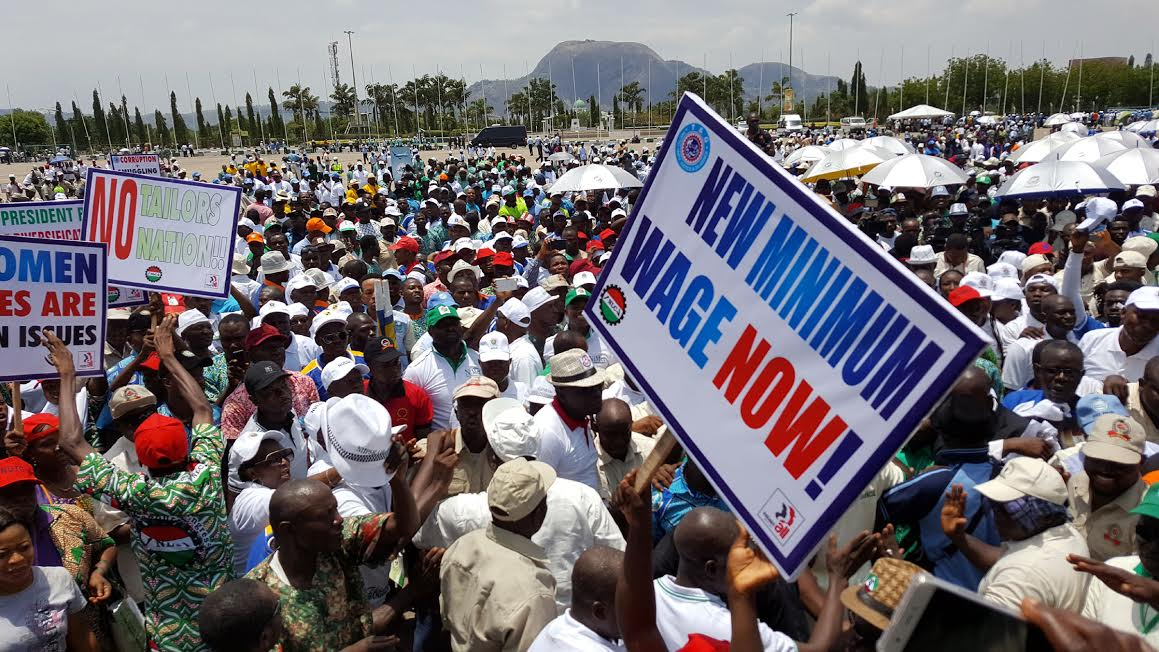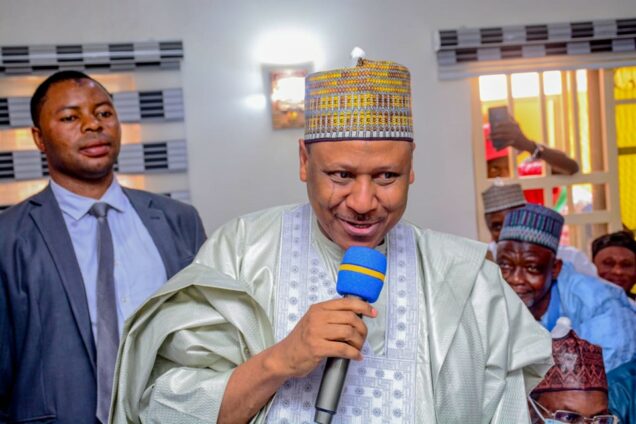"New minimum wage now"
Since I became conscious of labour activism during my secondary school days, back in the 90s, agitation for pay rise by the organised labour is one recurring decimal that has characterised employee-employer relations in the Nigeria industrial landscape. At the imminent risk of being e-lynched, this week I have chosen to write on this topic with a slant that I know would definitely not sit well with most Nigerian workers, especially those in the public sector.
Whenever there is a government policy in any sector that triggers a hike in the cost of living, the organised labour would always come up with a demand for a pay rise, among other things. I have never for once, been convinced that it is the right call to make because it looks like a never-ending cycle to me. But I won’t blame them, simply because those we’ve been having as minders of our political economy, seem to either lack the technocratic know-how, or the political will to implement counter-policies in other sectors that would compensate for, or reverse, the hike. This is due to reasons that are too numerous to highlight in this piece, due to the tyrannies of need for focus, space and time. Meanwhile, they live a life immune against the harsh reality of the consequences of their official actions. They live on the State’s resources. Everything is heavily subsidised by the government, for them, in sharp contrast to that of the common man.
So, the lowest hanging fruit by way of a response from the organised labour is to demand for a “pay rise”. But if history is to be our guide, then I would say, it has not, yielded, and would never yield, the needed result. Rather, it precipitates further inflation – a more ferocious one at that, as soon as it (the pay rise) is announced. Its implementation means, too much money would be in circulation, chasing too few goods – Demand-pull inflation.
To buttress my point, in addition to what my senior secondary school Economics teachers told me, reinforced by my own personal research and experiences, when you have too much money in circulation, without a commensurate increase in productive activities to boost supply, in a way that it matches the demand, the ultimate result is “inflationary pressure” on the economy. This, coupled with some occurrences in our contemporary history, especially, in the immediate past administration of President Muhammadu Buhari, which implemented policies that pumped too much money into circulation with little or no direct bearing with the productivity in the real sector, make inflation walk on all four. That is what has been happening in Nigeria over the years, under successive administrations. But that of Buhari went notches higher. Whenever the government needed money, but there is no enough in the government vault, they simply resorted to borrowing (internally and externally). Where he failed to secure the parliamentary approval for such borrowings, the CBN simply printed more notes. That perhaps is part of what they call “Ways and Means”, that turned out to be a massive embarrassment for the 9th National Assembly who approved it. So, the Buhari administration came up with many social intervention policies like the N-Power, Conditional Cash Transfer (to the vulnerable), among others. Others, like the “Trader Moni”, and the Anchor Borrowers Programme (ABP) of the Central Bank of Nigeria (CBN), are credit schemes that were intended to be repaid, but were not so designed – the communicated intentions contradicted the designs. When the administration ran out of cash, they resorted to printing money, and sharing same, at the Federation Account and Location. It would be recalled that, the Edo State Governor, Godwin Obaseki, sometimes in April 2021, raised the alarm and warned us of the inherent danger underlying such an economic model, popularised by the late Ugandan Head of State, Idi Amin. Godwin Obaseki, said Nigeria is in huge financial trouble, alleging that, as much as a whooping sum of ₦60billion was, at a time, printed by the CBN, to augment what was to be shared by the Federation Account Allocation Committee (FAAC). This is what I call “the Kao Kudi” economic philosophy.
Advertisement
The money these policies pumped into the circulation, apart from being corruption-ridden, never brought about a commensurate increase in productive activities, at least, in the real sector, for the purpose of achieving a state of equilibrium between the market forces of demand for, and supply of, goods and services. The same also goes for the ill-conceived, ill-thought-out ABP of the CBN. It is a kind of soft (interest-free, or low interest) loan, given to about 70,000 farmers across the country, by the apex bank. That was the peak of the CBN’s involvement in what looks like a retail-banking, contrary to its core mandate of formulating monetary policies for the efficient and effective management of the country’s economy. “The matter tie wrapper”, as we say it in Pidgin English.
The irony of the whole thing is that, most of the beneficiaries of the loan schemes, intended to boost food (especially rice and other grains’) production, stimulate commercial activities in the country were diverted to, either, marrying additional wives, or embarking on pilgrimages and other frivolous and non-economic ventures. Furthermore, the loans were given out without the due process of “Credit Risk Evaluation” (CRE). There was no profiling the applicants to determine their credit worthiness, and by extension, their eligibility. Most of the loan, expectedly, went bad because there was no profit, some, due to reasons highlighted above, and others due to factors beyond the beneficiaries’ control. In the case of the farmers who took the loan under the ABP, for instance, factors like flooding, insecurity, lack of processing equipment, lack of storage facilities, poor transportation system (lack of rural access roads), among others, conspired against a robust return on investment for the few who applied the loan appropriately. But the bottom line is that, the money, ₦1.09 trillion (one-point-zero-nine trillion Naira) from the ABP alone, found its way into the circulation without corresponding productivity, and the result is part of the inflation we’re experiencing currently in the area of foodstuffs, especially. And any additional money in the system would worsen the already-bad situation.
Please do not get me wrong. I am not saying workers don’t deserve a pay rise, or the amount they’re asking for. As a Marxist, I believe in the theory of “Surplus Value”, as propounded by Karl Marx. It posits that the difference between the cost of production, and the amount the end product is sold, is the worth of the labour put into producing the good or the service. And if we all agree that, what workers are getting is a far cry from that difference, then there is a strong need to advocate for a pay rise, in line with the thrust of the theory. But in this context, there is a need for circumspection.
Advertisement
In my university days, I did not major anything in Economics or Econometrics, so I won’t stand here, pretending to know much about how to fix our ailing economy. But my about-four-decade of earthly existence, during which I have witnessed, first-hand, the concomitant inflationary consequences, whenever money is unnecessarily released into the circulation, has taught me that the idea is not going to do any good to our ailing economy. I can say without any fear of equivocation that, there is a strong reason the organised labour should resist the attraction of the impending minimum wage increase, deserving of it, as the workers may deem themselves. History has it that, after the implementation in 1975, of the “Udoji Salary Award” by the Federal Government to Nigerians workers, in a bid to reflate what looked like a recessive economy then, triggered the rise of inflation which jumped from about 3% in 1973 to about 12% about 3 years later.
That reminds me of a debate I had with my mother – then a teacher, (but now retired), when former President, Olusegun Obasanjo, increased the minimum wage to ₦5,000. The old woman was rejoicing and praying for Baba Iyabo, emphasising how humongous the amount was, in her eyes. ₦5,000, and how long a way it would go in catering for the needs of the family. A whole ₦5,000! Then I tried explaining to her that it would have been better if the administration implemented policies that would bring down prices of essential goods and services. But, my mom would have none of that. “We’re talking about money”, she retorted. Then I asked: “mommy, did you remember that there was a time, when you always killed a fowl every three-day for the family’s protein needs; when we never ran out of beverages in the house; and when we had no business, cooking with firewood, but stove which was for the elites then”? She replied in the affirmative. I then asked her, “how much was her salary then?”, and she replied, “it was about ₦125 (one hundred and twenty-five Naira)”. Then, I asked, why did all those goodies stop? She said, they became too expensive and unaffordable. And I asked again: do you think this new ₦5,000 minimum wages could restore the good life of the good old days? She did not utter a word. But I insisted on getting a response to my question. And the old woman said, “you are too young to understand all these things”. Meanwhile, I was already an under-Graduate then. But I knew her too well to understand when she’s accepted defeat in an argument with me, or any of my siblings (her children). That is usually her closing remark (“ọmọdé ni yín. Kò lè yé yín” – meaning, you people are too young to understand what the issues are). I went further, explaining that, didn’t she think that, it would have been better for Baba Iyabo tó implement policies that would bring the prices of those commodities back to how they were then? She looked at me, cogitated for a moment, and then said, “Never. I won’t reject my salary, on account of your argument that does not hold water”. But then, I knew I had succeeded in provoking her into thinking beyond my “youthfulness”, and viewing it from another perspective, even though she wouldn’t admit it openly.
Why can’t the organised labour anchor their agitations around, certain deliverables, like stable power supply; fixing the moribund refineries, and other critical infrastructures; then policies that will bring down the cost of living, by and large? Why can’t they insist that, the government formulates, and implements policies that would reduce the costs of healthcare services, education, housing, and transportation, among other social welfare packages, instead of the “poisoned chalice” called increased minimum wage? Do they realise that, any increase in the minimum wages will have multiplier effects, especially, on the manufacturing sector, and that the extra cost of remuneration will be passed on to the ultimate consumers in the form of increased prices? Do they realise that they are a part of the community of consumers who would bear the cost, in a way that would erode the value of the new wages? Do they think the landlords would leave the amount they charge as rent at the same rate as before, the moment the minimum wage is increased? Before the first salary is paid, the ripple effects would have eroded the envisaged benefits. It will reduce the quantity, and maybe the quality of what that money can buy. After all, money, like the saying goes, is what money can buy. The organised labour seems to have forgotten that, just like the hike in the pump price (a component of cost of operation) affected the price of everything, an increase in workers’ emolument, therefore, will have the same impact.
Let me now go to the ultimate issue. Does the organised labour think that our “Emperors” at the 36 State Government Houses would pay? Apologies to Senator Sheriake Dickson who said that the 1999 constitution only created emperors, among whom are the 36 State Governors. Have they forgotten that not all the Governors implemented the previous ones passed into law, like the ₦5,000, ₦18,000, and ₦3,000? If reports emanating from Kogi State is anything to go by, what Governor Yahaya Bello paid for eight years, before he handed over about two months ago, was in the region of ₦5,000 (minimum wage), in reality. Now that he’d handed over to Governor Usman Òdodo – the reported author of the “amputated minimum wages” that I referred to as “a maximum minimum wage”, nothing has changed. Nobody, no worker, including pensioners, in Kogi State, is expecting any change, any time soon either. Forget about the windfall from total fuel subsidy removal, most State Governors won’t pay, no matter how much revenue they get from the FAAC. Except for a few States where decency in governance still has a space, the Governors would make a mess of it.
Advertisement
These are the things I expect the NLC and the TUC to keep at the back of their minds, as they push for a jerk up in the national minimum wage, from the yet-to-be-fully-implemented ₦30,000, to (I learnt they’re pushing for) about ₦500,000 – half a million Naira. My advice is so that, the government would not end up collecting with the left hand, much more than it has given them with the right hand.
Abubakar writes from Ilorin. He can be reached via [email protected].
Views expressed by contributors are strictly personal and not of TheCable.







